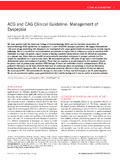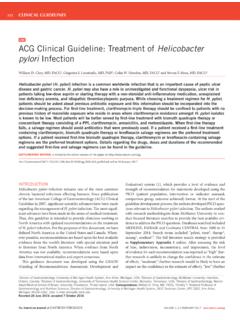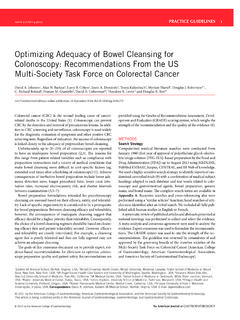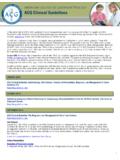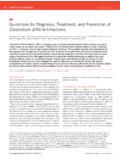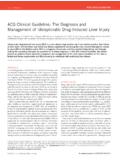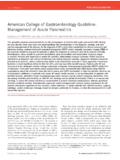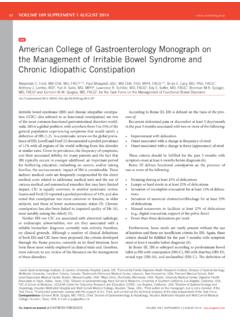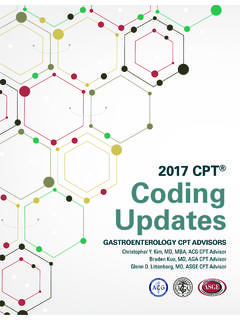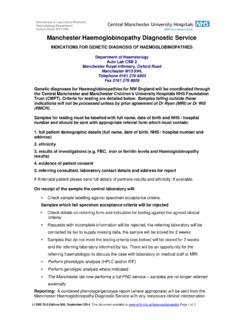Transcription of ACG Clinical Guideline: Genetic Testing and …
1 Nature publishing group223 2015 by the American College of Gastroenterology The American Journal of GASTROENTEROLOGYPRACTICE guidelines Hereditary gastrointestinal (GI) cancer syndromes represent a phenotypically diverse group of disorders that exhibit distinct patterns of inheritance in an individual s progeny. Over the past few decades, the expansion of familial cancer registries and ad-vancement in genomics have led to the development of Clinical diagnostic criteria for specifi c hereditary syndromes as well as the discovery of multiple genes in which germline mutations predispose individuals to syndrome-associated neoplastic mani-festations. Th is guideline fi rst discusses essential elements of a patient s personal and family history that allow for risk assess-ment for potential inherited cancer susceptibility.
2 It then ad-dresses the currently most well-characterized GI cancer suscep-tibility syndromes: Lynch syndrome (LS), familial adenomatous polyposis (FAP), attenuated familial adenomatous polyposis (AFAP), MUTYH -associated polyposis (MAP), Peutz Jeghers syndrome (PJS), juvenile polyposis syndrome (JPS), Cowden syndrome (CS), serrated (hyperplastic) polyposis syndrome, hereditary pancreatic cancer, and hereditary gastric cancer. For each of these syndromes, we outline diagnostic criteria and in-dications for Genetic evaluation, describe the currently known associated underlying genes, and make recommendations for surveillance and management of at-risk individuals and those found to carry a defi nitive disease-causing mutation. Finally, we discuss the elements of informed consent that must accompany Genetic evaluation as well as currently evolving Genetic Testing technologies that may change how Genetic Testing is conducted in the near-term future.
3 Each section of the document presents summary statements, the key recommendations related to the section topic, followed by a summary of the supporting evidence ( Tables 1 and 2 ). A ACG Clinical Guideline: Genetic Testing and Management of Hereditary Gastrointestinal Cancer Syndromes S a p n a S y n g a l , M D , M P H , F A C G 1 , 2 , 3 , R a n d a l l E . B r a n d , M D , F A C G 4 , J a m e s M . C h u r c h , M D , F A C G 5 , 6 , 7 , Francis M. Giardiello , MD 8 , Heather L. Hampel , MS, CGC 9 a n d R a n d a l l W . B u r t , M D , F A C G 10 This guideline presents recommendations for the management of patients with hereditary gastrointestinal cancer syndromes.
4 The initial assessment is the collection of a family history of cancers and premalignant gastrointestinal conditions and should provide enough information to develop a preliminary determination of the risk of a familial predisposition to cancer. Age at diagnosis and lineage (maternal and/or paternal) should be documented for all diagnoses, especially in fi rst- and second-degree relatives. When indicated, Genetic Testing for a germline mutation should be done on the most informative candidate(s) identifi ed through the family history evaluation and/or tumor analysis to confi rm a diagnosis and allow for predictive Testing of at-risk relatives. Genetic Testing should be conducted in the context of pre- and post-test Genetic counseling to ensure the patient s informed decision making. Patients who meet Clinical criteria for a syndrome as well as those with identifi ed pathogenic germline mutations should receive appropriate surveillance measures in order to minimize their overall risk of developing syndrome-specifi c cancers.
5 This guideline specifi cally discusses Genetic Testing and management of Lynch syndrome, familial adenomatous polyposis (FAP), attenuated familial adenomatous polyposis (AFAP), MUTYH -associated polyposis (MAP), Peutz Jeghers syndrome, juvenile polyposis syndrome, Cowden syndrome, serrated (hyperplastic) polyposis syndrome, hereditary pancreatic cancer, and hereditary gastric cancer. Am J Gastroenterol 2015; 110:223 262; doi: ; published online 3 February 2015 1 Brigham and Women s Hospital , Boston , Massachusetts , USA ; 2 Dana Farber Cancer Institute , Boston , Massachusetts , USA ; 3 Harvard Medical School , Boston , Massachusetts , USA ; 4 Department of Medicine, Division of Gastroenterology, Hepatology and Nutrition, University of Pittsburgh Medical Center , Pittsburgh , Pennsylvania , USA ; 5 Department of Colorectal Surgery, Cleveland Clinic , Cleveland , Ohio , USA ; 6 Sanford R Weiss, MD, Center for Hereditary Colorectal Neoplasia, Cleveland Clinic Foundation , Cleveland , Ohio , USA ; 7 Digestive Disease Institute, Cleveland Clinic Foundation , Cleveland , Ohio , USA.
6 8 Johns Hopkins University School of Medicine , Baltimore , Maryland , USA ; 9 Department of Internal Medicine, Ohio State University , Columbus , Ohio , USA ; 10 Huntsman Cancer Institute, University of Utah School of Medicine , Salt Lake City , Utah , USA . Correspondence: Sapna Syngal, MD, MPH, FACG, Dana Farber Cancer Institute , 450 Brookline Avenue, Dana 1124 , Boston , Massachusetts 02215 , USA . E-mail: Received 12 September 2014 ; accepted 10 December 2014 CMES yngal et al. The American Journal of GASTROENTEROLOGY VOLUME 110 | FEBRUARY 2015 224 Table 1 . Summary statements Standard for minimal cancer family history assessment in gastrointestinal (GI) practice A family history of cancer and premalignant GI conditions that provides suffi cient information to develop a preliminary determination of the risk of a familial predisposition to cancer should be obtained for all patients being evaluated in outpatient gastroenterology and endoscopy practices.
7 Essential elements of a family history include presence and type of cancer diagnoses in fi rst- and second-degree relatives, and presence and (ideally) type of polyps in fi rst-degree relatives; age and lineage should be noted for each diagnosis. Lynch syndrome (LS) All newly diagnosed colorectal cancers (CRCs) should be evaluated for mismatch repair defi ciency. Analysis may be done by immunohistochemical Testing for the MLH1/MSH2/MSH6/PMS2 proteins and/or Testing for microsatellite instability. Tumors that demonstrate loss of MLH1 should undergo BRAF Testing or analysis for MLH1 promoter hypermethylation. Individuals who have a personal history of a tumor showing evidence of mismatch repair defi ciency (and no demonstrated BRAF mutation or hypermethylation of MLH1) , a known family mutation associated with LS, or a risk of 5% chance of LS based on risk prediction models should undergo Genetic evaluation for LS.
8 Genetic Testing of patients with suspected LS should include germline mutation Genetic Testing for the MLH1 , MSH2 , MSH6 , PMS2 , and/or EPCAM genes or the altered gene(s) indicated by immunohistochemical (IHC) Testing . Adenomatous polyposis syndromes Familial adenomatous polyposis (FAP)/MUTYH-associated polyposis/attenuated polyposis Individuals who have a personal history of >10 cumulative colorectal adenomas, a family history of one of the adenomatous polyposis syndromes, or a history of adenomas and FAP-type extracolonic manifestations (duodenal/ampullary adenomas, desmoid tumors (abdominal>peripheral), papillary thyroid cancer, congenital hypertrophy of the retinal pigment epithelium ((CHRPE), epidermal cysts, osteomas) should undergo assessment for the adenomatous polyposis syndromes. Genetic Testing of patients with suspected adenomatous polyposis syndromes should include APC and MUTYH gene mutation analysis.)
9 Hamartomatous polyposis syndromes Peutz Jeghers syndrome (PJS) Individuals with perioral or buccal pigmentation and/or two or more histologically characteristic gastrointestinal hamartomatous polyp(s) or a family history of PJS should be evaluated for PJS. Genetic evaluation of a patient with possible PJS should include Testing for STK11 mutations. Juvenile polyposis syndrome (JPS) Individuals with fi ve or more juvenile polyps in the colorectum or any juvenile polyps in other parts of the GI tract should undergo evaluation for JPS. Genetic evaluation of a patient with possible JPS should include Testing for SMAD4 and BMPR1A mutations. Cowden syndrome (PTEN hamartoma tumor syndrome) Individuals with multiple gastrointestinal hamartomas or ganglioneuromas should be evaluated for Cowden syndrome and related conditions.
10 Genetic evaluation of a patient with possible Cowden syndrome should include Testing for PTEN mutations. Serrated/hyperplastic polyposis syndrome Individuals who meet at least one of the following criteria have the Clinical diagnosis of serrated polyposis syndrome (SPS): (i) at least 5 serrated polyps proximal to the sigmoid colon with 2 of these being >10 mm; (ii) any number of serrated polyps proximal to the sigmoid colon in an individual who has a fi rst-degree relative (FDR) with serrated polyposis; and (iii) >20 serrated polyps of any size, distributed throughout the large intestine. A clear Genetic etiology has not yet been defi ned for SPS, and therefore Genetic Testing is currently not routinely recommended for SPS patients; Testing for MUTYH mutations may be considered for SPS patients with concurrent adenomas and/or a family history of adenomas.

